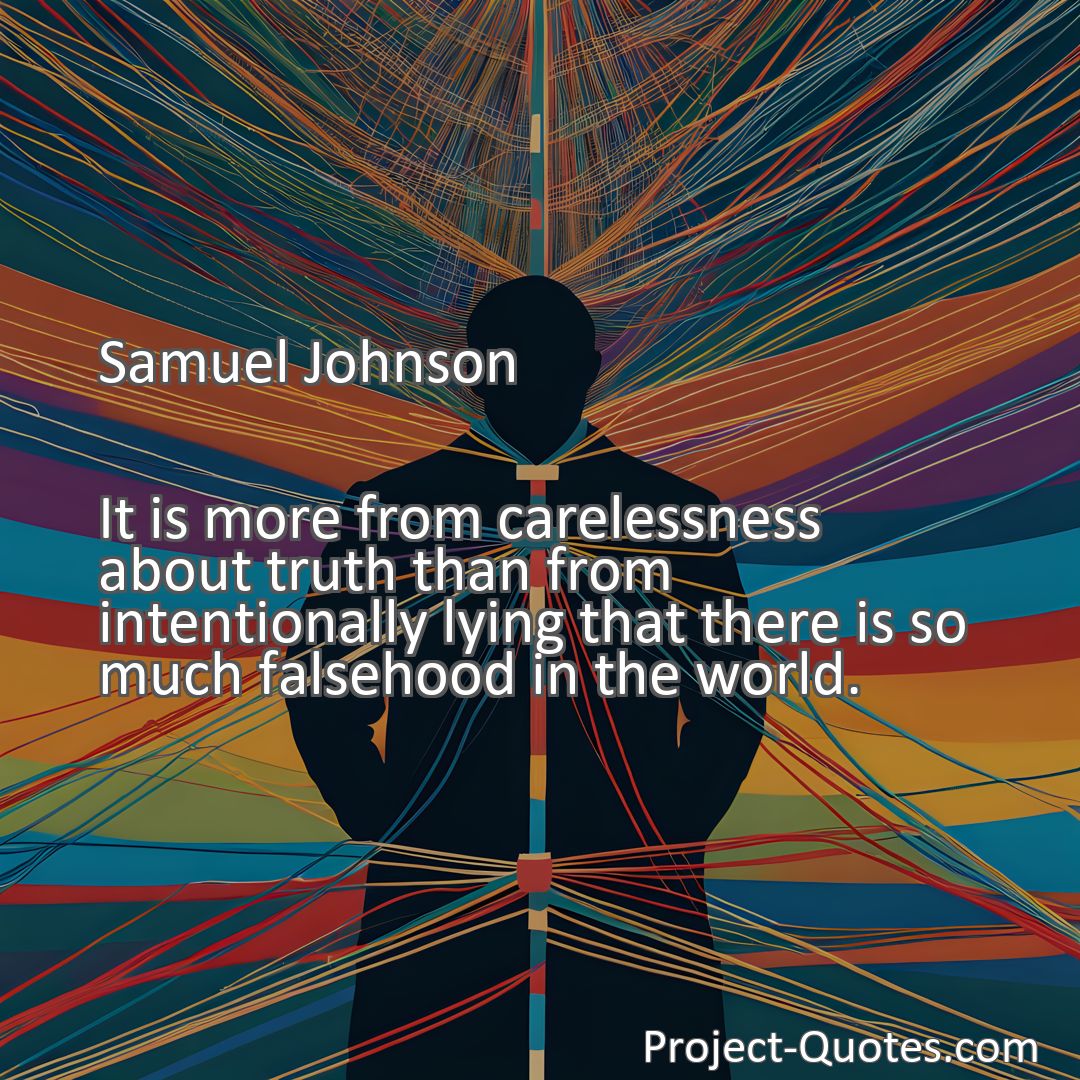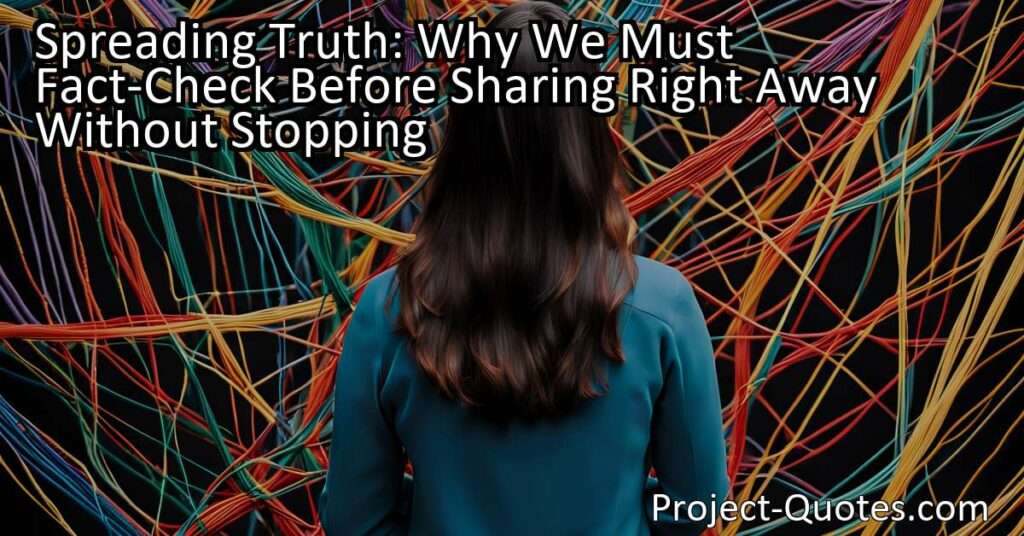It is more from carelessness about truth than from intentionally lying that there is so much falsehood in the world.
Samuel Johnson
Spreading Truth: Fact-Checking Before Sharing KEYWORD: right away without stopping It’s important to fact-check information before sharing it, as most false information isn’t intentional lies, but rather a result of carelessness. Just like in the game of telephone, information can get jumbled up when passed on without double-checking. By taking the time to verify the accuracy of what we share, we can help prevent the spread of false information and promote honesty.
Table of Contents
- 1 It is more from carelessness about truth than from intentionally lying that there is so much falsehood in the world.
- 2 Samuel Johnson
- 3 Meaning of Quote – It is more from carelessness about truth than from intentionally lying that there is so much falsehood in the world.
- 4 Freely Shareable Quote Image
- 5 Related
Meaning of Quote – It is more from carelessness about truth than from intentionally lying that there is so much falsehood in the world.
Hey there! Lets talk about something that Samuel Johnson, a very wise person from long ago, once said. He once mentioned, “It is more from carelessness about truth than from intentionally lying that there is so much falsehood in the world.” Now, that’s a fancy way of saying that most of the time when things arent quite right, its not because people are trying to be sneaky or lie on purpose. Its usually just because they aren’t being careful about making sure what they’re saying is totally correct.
Let’s think about why this might be, shall we? Imagine you’re playing a game of telephone with your friends you know, where one person whispers something to the next person, and it goes around the circle until the last person says what they heard out loud. More often than not, the message gets all jumbled up and doesn’t sound anything like what it started as. This isn’t because your friends are trying to mix up the words on purpose. It’s usually because someone didnt hear it correctly, or maybe they forgot a part of the message before passing it on. Just like in the game, people in the real world can be careless in how they pass on information.
Sometimes, we hear something quickly, or we only catch part of the story, and then we repeat it to someone else without double-checking to make sure it’s right. Maybe you overhear someone talking about a pop quiz next week, and you tell your friend that the quiz is on Monday. But if you had listened closely, you might have caught that the quiz was actually on Wednesday, not Monday! Oops! That’s carelessness, not a lie, but it still could lead to some mix-ups and studying on the wrong night.
In the world of grown-ups, this happens a lot, too. People might see something on the internet and share it right away without stopping to check if it’s true. Or they might remember a fact wrongly but tell someone else with a lot of confidence, so it spreads. With news and stories zooming around as fast as they do these days, you can imagine how quickly the wrong information can spread!
Let’s look at another example. Have you ever played the game where you have to say what someone else did, but you keep adding more actions to it? It might start with something simple like, “Sarah went to the store.” Then the next person might say, “Sarah went to the store and bought a loaf of bread.” By the time it gets to the end, the story has grown into something like, “Sarah went to the store, bought a loaf of bread, saw a dancing clown, learned to juggle, and flew to the moon!” It sounds silly, but that’s kind of what happens when people aren’t careful with the truth. Each time a story is told, something might be added or changed just a bitand not because anyone means to lie, but because each person remembers it a little differently, or they want to make it more interesting.
Now, why is this important to think about? Well, when we’re not careful with the truth, it can cause all sorts of chaos. Let’s say someone spreads the wrong date for a big school event. Some people might show up on the wrong day and miss out on the fun. Or what if someone misunderstood a rule of a game and explained it wrong to everyone else? The game would be played incorrectly, and it might not be fair or as fun as it should be.
Being careful with the truth also means respecting other people. When we make sure that what we’re saying is right, or when we correct a mistake we made, we’re showing that we value honesty and we want others to trust us. Trust is super important because when people trust each other, they feel safe, and everyone can work together better.
Samuel Johnsons thoughts about carelessness and falsehood are a good reminder for all of us to slow down a bit. Its like taking that extra minute to tie your shoes properly so you dont trip later on. If we take the time to fact-check something before passing it on or think about whether what we’re saying is really true, we can avoid spreading the false info that leads to mix-ups. And if were not sure about something, its totally okay to say, “I don’t know,” or “Let me check on that.”
Weve all been careless at some point, and we probably will be again because nobodys perfect. The important thing is to try our best to be honest and accurate. And if we mess up, that’s okay too, as long as we fix it and learn from our mistakes.
Remember, we all have a part to play in making sure the truth gets shared, not just the half-remembered bits of it. So next time you hear a piece of news or a fun fact, take a moment to think about where it came from and how true it might be. With a little bit of care, we can all help keep the world a bit more honest, piece by piece. Samuel Johnson would probably be proud to see us trying so hard to keep the truth alive amidst all the noise! And who knows? By being more truthful, we might just inspire others to do the same, creating a ripple effect of honesty that makes the world a better, clearer place for everyone.
I hope this quote inspired image brings you hope and peace. Share it with someone who needs it today!


